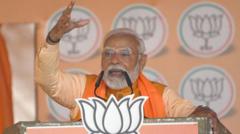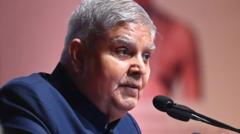The Bharatiya Janata Party (BJP) is set to govern Delhi after a significant electoral win, marking its first majority since 1998 and raising questions about the future of its rival, the Aam Aadmi Party (AAP).
BJP Secures Landmark Victory in Delhi Elections After 27 Years

BJP Secures Landmark Victory in Delhi Elections After 27 Years
Modi's party triumphs over AAP, reshaping Delhi's political landscape.
In a dramatic turnaround, Prime Minister Narendra Modi's Bharatiya Janata Party (BJP) has won the Delhi Assembly elections, allowing the party to regain control of the nation's capital for the first time in nearly three decades. The BJP has secured or is leading in 47 out of the 70 seats in the legislative assembly, while the Aam Aadmi Party (AAP) trails with leads in just 23 seats, according to preliminary results from the Election Commission of India (EC).
The election held paramount significance for both parties, serving as a referendum on their governance. Prime Minister Modi celebrated the result, tweeting, "Development wins, good governance triumphs," and promising to prioritize Delhi's development. The AAP had maintained governance since 2013, but recent corruption allegations against its leaders have hampered their credibility.
For the BJP, which had not held power in Delhi since 1998, this victory not only consolidates its position in the capital but also reflects the party's growing influence across India following successes in other states like Maharashtra and Chhattisgarh. BJP's high-profile campaigning included appearances from Modi and Home Minister Amit Shah, showcasing the party's commitment to reclaim the capital.
The Congress party was a distant contender in the elections and appears set to remain without representation in the Assembly, extending a disappointing trend since their ouster in 2013 amid corruption scandals that benefitted the rise of AAP.
Voter turnout was impressive, with over 60% of eligible voters participating. This marked a critical test for AAP, especially after its leaders—Kejriwal and Sisodia—lost pivotal constituencies, prompting Kejriwal to acknowledge the verdict while expressing hope that the BJP would meet voter expectations.
Political analysts attribute the AAP's defeat to several factors, including public fatigue after more than ten years in power and the BJP's aggressive campaign strategy. With previous allegations of corruption overshadowing AAP's achievements in education and healthcare, many voters shifted their support toward the BJP's message of "Parivartan" or change, bolstered by promises of stability from having aligned state and federal governance.
As the BJP prepares to take control, the fragmented opposition, particularly AAP, faces intense scrutiny regarding its future in a landscape that now favors Modi's party. The unique governance structure in Delhi further complicates political dynamics, as the lieutenant governor appointed by the federal government oversees crucial matters such as public order and police, potentially leading to conflicts with the newly elected Assembly.
Meanwhile, the campaign strategies from both parties largely focused on welfare initiatives, leaving out critical issues like air pollution that has plagued Delhi for years. The BJP's ambitious pledge to significantly improve the city's air quality by 2030 aims to address long-standing environmental concerns, albeit without dominating this election cycle.
As the dust settles on this historic electoral battle, the implications for Delhi and national politics are profound, indicating a potential shift in the opposition's relevance and the BJP's enduring strength.
The election held paramount significance for both parties, serving as a referendum on their governance. Prime Minister Modi celebrated the result, tweeting, "Development wins, good governance triumphs," and promising to prioritize Delhi's development. The AAP had maintained governance since 2013, but recent corruption allegations against its leaders have hampered their credibility.
For the BJP, which had not held power in Delhi since 1998, this victory not only consolidates its position in the capital but also reflects the party's growing influence across India following successes in other states like Maharashtra and Chhattisgarh. BJP's high-profile campaigning included appearances from Modi and Home Minister Amit Shah, showcasing the party's commitment to reclaim the capital.
The Congress party was a distant contender in the elections and appears set to remain without representation in the Assembly, extending a disappointing trend since their ouster in 2013 amid corruption scandals that benefitted the rise of AAP.
Voter turnout was impressive, with over 60% of eligible voters participating. This marked a critical test for AAP, especially after its leaders—Kejriwal and Sisodia—lost pivotal constituencies, prompting Kejriwal to acknowledge the verdict while expressing hope that the BJP would meet voter expectations.
Political analysts attribute the AAP's defeat to several factors, including public fatigue after more than ten years in power and the BJP's aggressive campaign strategy. With previous allegations of corruption overshadowing AAP's achievements in education and healthcare, many voters shifted their support toward the BJP's message of "Parivartan" or change, bolstered by promises of stability from having aligned state and federal governance.
As the BJP prepares to take control, the fragmented opposition, particularly AAP, faces intense scrutiny regarding its future in a landscape that now favors Modi's party. The unique governance structure in Delhi further complicates political dynamics, as the lieutenant governor appointed by the federal government oversees crucial matters such as public order and police, potentially leading to conflicts with the newly elected Assembly.
Meanwhile, the campaign strategies from both parties largely focused on welfare initiatives, leaving out critical issues like air pollution that has plagued Delhi for years. The BJP's ambitious pledge to significantly improve the city's air quality by 2030 aims to address long-standing environmental concerns, albeit without dominating this election cycle.
As the dust settles on this historic electoral battle, the implications for Delhi and national politics are profound, indicating a potential shift in the opposition's relevance and the BJP's enduring strength.


















